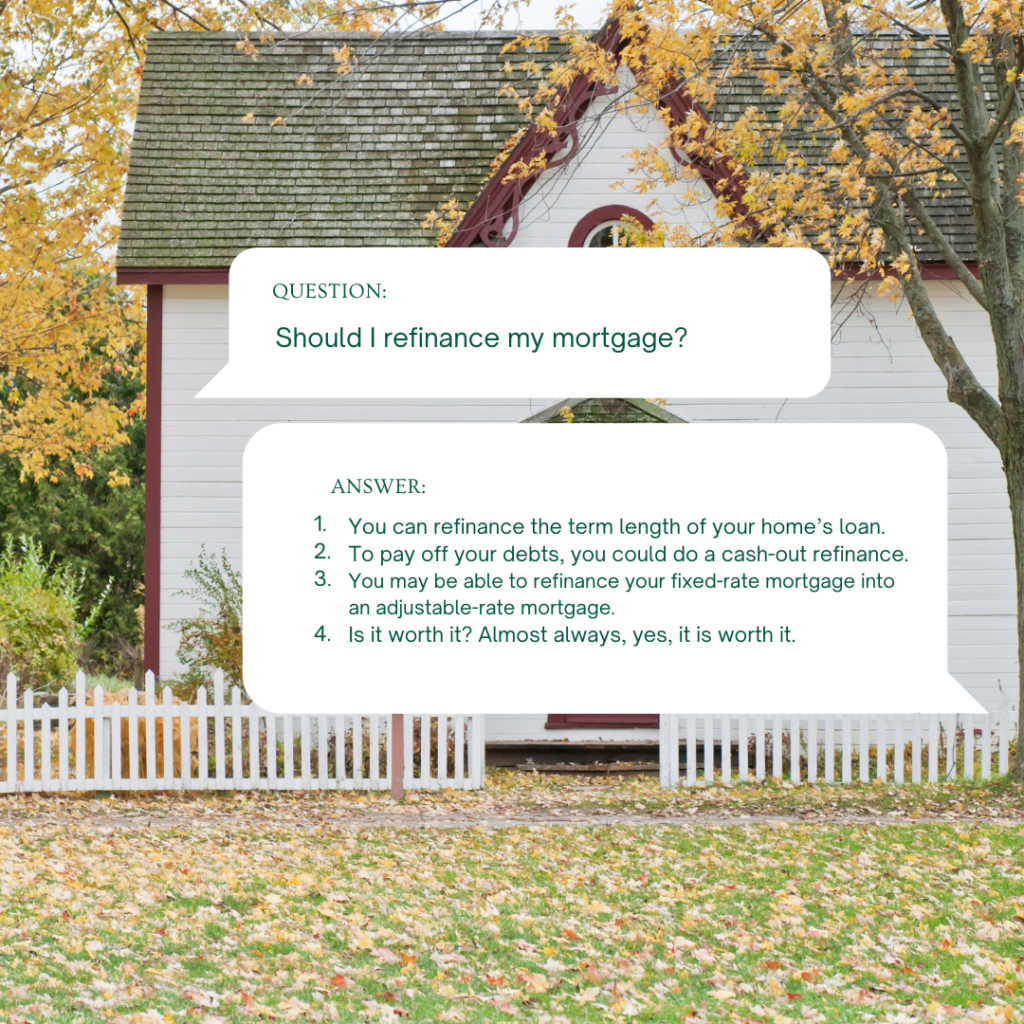
Should I Refinance My Mortgage?
You’ve come across this article most likely because you’re interested in answering ‘Should I refinance my mortgage?’ Well, you have come to the right place! While rates are ever-changing, one thing is for certain, the refinance rates for 2020/2021 have been in the record lows. We’re talking in the low to mid-2 percent range as of late. However, interest rates do change so, keep that in mind when reading this article.
Refinancing your mortgage loan will help you have a lower monthly payment as well as potentially helping you consolidate debt or maybe get some cash from your house’s equity. Refinancing also lets you possibly change the length of your loan.
Should I Refinance My House?
The short answer here is, yes. When asking yourself ‘Should I refinance my mortgage?’ and if you are in a situation where you are able/capable of doing so, we highly recommend getting the lowest rate you possibly can. Ultimately doing so saves you money in the long term. Who doesn’t want that?
 Changes to Your Loan Term
Changes to Your Loan Term
Whether you have a 15-year mortgage or a 30-year one, you can refinance the term length of your home’s loan. For instance, if you are currently paying a 15-year loan, you have the option to refinance to a 30-year loan instead.
Pro & Con of Refinancing to a Longer Loan
What does that do? A longer mortgage term can decrease the monthly amount of your loan. But, you may have a slight increase in your interest rate because lenders factor in inflation. Plus, the longer loan term will most likely result in you having to pay more interest over the years. Going from a short-term to a longer-term mortgage is great to free up some extra cash for you, especially if you are in a circumstance where that matters most to you.
Pro & Con of Refinancing to a Shorter Loan
On the opposite end of the loan term spectrum, you can refinance a 30-year loan down to a 15-year loan. By doing so, you will probably see a lower interest rate on your mortgage plus you will also own the home twice as fast compared to a longer-term. A shorter loan term typically indicates that your monthly payments will be higher, so we recommend making sure that you want to go that route when refinancing to a shorter term.
Should I Refinance My Mortgage to Pay Off Debt?
One of the best things about owning your home is that each mortgage payment is equity in your home. What is equity? That is the difference between the cost you still owe your lender for the mortgage and what the fair market value of your home is. If your loan is over five years old, chances are, you have built up some equity in your largest investment – your home.
To pay off your debts, you could do a cash-out refinance. This would allow you to consolidate your debts to a lower interest rate which you then just pay once a month. Consolidating will help you keep track of bills instead of having multiple monthly payments to keep track of.
Some people also use the cash-out refinance option to pay for updates or renovations to their home/property. Since mortgage rates are currently* lower than credit card interest rates, you could do a cash-out refinance and use that money to pay 1) less interest over time and 2) for those renovations you’ve been wanting to do.
*Again, remember that rates are always changing. Check your credit card interest rate versus current mortgage rates when deciding to do this option.
Should I Refinance My Mortgage to Convert Rate Mortgage Types?
When applying for a mortgage, homebuyers will choose to do an adjustable-rate mortgage or a fixed-rate mortgage. Adjustable-rate (ARM) typically offers lower interest rates towards the early stages of a loan. However, after a set amount of years, that rate could vary and could become costly over time.
A fixed-rate mortgage simply means that the interest rate remains the same for the entire length of your mortgage.
In this case, you may be able to refinance your fixed-rate mortgage into an adjustable-rate mortgage if interest rates are decreasing and/or if you are going to sell your house before the fixed interest initial stage ends. This refinance option could also ultimately save you $$.
So, Should I Refinance My House?
This refinancing decision is up to you. Can it be an in-depth process? Sometimes. Is it worth it? Almost always, yes, it is worth it. Hopefully, this article helps you figure out what the best money-saving (or money-earning) option is for you and your home!

